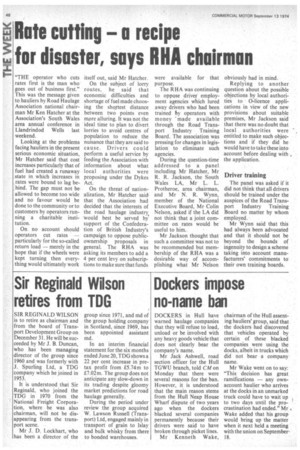Rate cutting a recipe for disaster, says RHA chairman
Page 50

If you've noticed an error in this article please click here to report it so we can fix it.
"THE operator who cuts rates first is the man who goes out of business first." This was the message given to hauliers by Road Haulage Association national chairman Mr Ken Hatcher at the Association's South Wales area annual conference in Llandrindod Wells last weekend.
Looking at the problems facing hauliers in the present serious economic situation, Mr Hatcher said that cost increases particularly that of fuel had created a runaway state in which increases in , rates were bound to lag be, hind. The gap must not be allowed to become too wide and no favour would be done to the community or to customers by operators running a charitable institution.
On no account should operators cut rates particularly for the so-called return load — merely in the hope that if the wheels were kept turning then everything would ultimately work itself out, said Mr Hatcher.
On the subject of lorry routes, he said that economic difficulties and shortage of fuel made choosing the shoytest distance between two points even more alluring. It was not the ideal time to plan to divert lorries to avoid centres of population to -reduce the nuisance that they are said to cause. Drivers could perform a useful service by feeding the Association with information about what local authorities were proposing under the Dykes Act.
On the threat of nationalization, Mr Hatcher sai& that the Association had decided that the interests of the road haulage industry. Would best be served by support of the Confederation of British Industry's campaign to oppose publicownership proposals in general. The RHA was asking its members to add a 4 per cent levy on subscriptions to make sure that funds were available for that purpose.
The RHA was continuing to oppose driver employment agencies Which lured away drivers who had been trained ty operators with money ' made available through the Road Transport Industry Training Board. The association was pressing for changes in legislation to eliminate such agencies.
During the question-time addressed to a panel including Mr Hatcher, Mr R. R. Jackson, the South Wales LA, Mr L. L. Protheroe, area chairman, and Mr N. R. Wynn, member of the National Executive Board, Mr Colin Nelson, asked if the LA did not think that a joint committee on rates would be useful to him.
Mr Jackson thought that such a committee was not to be recommended but membership of the RHA was a desirable way of accomplishing what Mr Nelson obviously had in mind.
Replying to another question about the possible objections by local authorities to 0-licence applications in view of the new provisions about suitable premises, Mr Jackson said that there was no doubt that local authorities were entitled to make such objections and if they did he would have to take these into account before dealing with , the application.
Driver training
The panel was asked if it did not think that all drivers should be trained under the auspices of the Road Transport Industry Training Board no matter by whom employed.
Mr Wynn said that this had always been advocated and that it should not be beyond the bounds of ingenuity to design a scheme taking into account manufacturers' commitments to their own training boards.




























































































































































































































